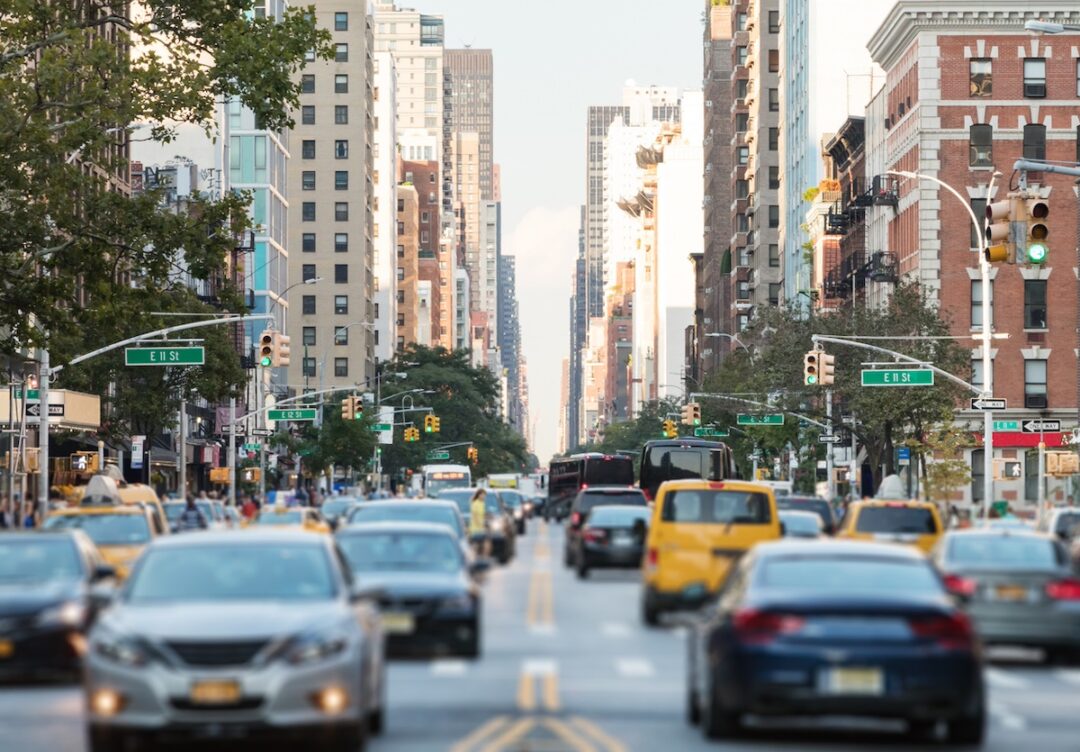
Visit Our Sponsors |
|
|
|
|
|
|
|
|
|
|
|
|
|
|
|
|
|
|
|
|
|
|
|
|
|
|
|
|
|
|
|
|
|
|
|
|
|
|

The battle over New York City’s congestion pricing program is heating up. On April 21, U.S. transportation secretary Sean Duffy issued a sternly worded, third warning to New York governor Kathy Hochul, demanding she cancel the Central Business District (CBD) Tolling Program in parts of the city.
The congestion charge program, similar to ones in San Diego, London, Singapore, Milan and Stockholm, began on January 5. It levies a $14.40-$21.60 toll on trucks each time they enter the zone in Manhattan south of 60th Street in peak periods, and $3.60-$5.40 for overnight visits. A $9 toll on most passenger vehicles is charged only once daily.
In a letter addressed to Hochul, dated April 21, Duffy’s office said the State of New York is breaking federal law and “risks serious consequences if it continues to fail to comply.” The letter gave the governor until May 21 to either certify that the collection of tolls has ceased, or provide an explanation for why its continuation does not violate federal law. Duffy said punitive actions could begin as soon as May 28, including withholding federal funding and approvals for future transportation projects in the state. Governor Hochul responded defiantly in a video posted on social media platform X April 21. "Let me repeat this for the people who didn't hear it the first ten or eleven times: Congestion pricing is legal, it's working. Business is up, traffic is down, and the cameras are staying on."
The stated goals of implementing the CBD were reducing traffic congestion, lowering pollution, and generating much-needed revenue for ailing public transit projects. But the road freight industry has pushed back hard, arguing that truck operators will bear the brunt of the charges. “Congestion pricing aims to reduce traffic in Manhattan’s Central Business District, but for the trucking industry, avoiding this area is rarely an option,” said the PrePass Safety Alliance, a non-profit public-private partnership of state agencies and trucking industry leaders, in a statement January 6, 2025, one day after the program came into effect.
Roads and bridges built with federal funds are generally mandated to be toll-free, and require an exception in order to charge drivers for their use — under the Value Pricing Pilot Program (VPPP), introduced in 1991. But only 17 out of 50 states (plus the District of Columbia) have no toll roads or bridges, and New York and New Jersey both have extensive highway toll systems, including the notoriously expensive George Washington Bridge ($130.08 for a truck with six axles, into Manhattan only). According to the U.S. Department of Transportation’s Federal Highway Administration statistics, New York state took in more than $5 billion in toll revenue in 2023, the last year for which data is available.
An exception for the CBD was granted by the Biden administration in November 2024, but was rescinded by Duffy on February 19, when he argued that the chief goal of the program was raising revenue for the Metropolitan Transit Authority (MTA), not the reduction of congestion.
Governor Hochul met with President Donald Trump in the Oval Office on February 21, and had what her office described as “a frank, candid conversation about New York’s key priorities including congestion pricing, immigration, infrastructure, economic development, energy, offshore wind and nuclear power.” Governor Hochul also presented President Trump with a booklet on the early success of congestion pricing. The Trump administration appears determined, however, to force her to end the program. Duffy set an initial deadline of March 21 to cease the program, and another for April 20, but Hochul shows no sign of complying.
The MTA, which operates the tolls, has challenged in federal court the administration’s decision to rescind the VPPP exception, and says the program does not violate federal law — a position backed up so far by a federal judge.
Impactful, But Is it Popular?
Hochul’s office in March said that traffic in the targeted area declined 11% in February, compared to the same period last year, and that traffic that month also moved 30% faster on bridge and tunnel crossings.
The MTA CEO and chair, Janno Lieber, said in March: “Congestion relief is working, cars and buses are moving faster, foot traffic is up and even noise complaints are down.” The MTA says the program is on track to generate $500m in revenue by the end of the year.
But the program is borderline popular with residents, businesses and visitors to New York City. A March survey found that 42% of New York City residents support keeping the toll, according to NBC New York, while 35% backed the attempts to quash it. Statewide, about one-third of people in New York state support the program, compared to 40% who want it halted, according to NBC.
Although there was a notable swing away from initial public resistance in London after the 2003 introduction of its Congestion Charge Zone program, this was in part due to a simultaneous improvement in public transport, and expansion of bike lanes; not something New York City, with its already decrepit public transport system and a current MTA budget that relies on now-unlikely federal funds, can offer, at least in the short term. Even if money from the CBD toll program was directly and exclusively funneled into improving transport alternatives to cars in New York City, it would be years before the effects were felt.
Hochul herself flip-flopped dramatically on implementing the program. In June 2024, she called off an earlier version of the congestion pricing plan, with higher charges than the ones currently in force, just two weeks before it was supposed to go into effect, saying she was concerned the program would have "too many unintended consequences" for middle-class families moving in and out of the congestion zone. Around the same time, New Jersey Governor Phil Murphy insisted that the plan must undergo additional federal environmental review. (Much of New York’s traffic, especially freight, originates in New Jersey.) But the program was greenlighted before the Trump administration came into power.
Hochul has a fight on her hands, and declining leverage in terms of Duffy’s threat of withholding federal funds. After a long history of sending more tax dollars to Washington than it receives back, New York state has been a net beneficiary of federal funds every year since 2019. According to the Office of the New York State Comptroller, for every tax dollar paid to Washington in the 2023 financial year, the state received $1.06 in return; the national average was $1.32.
“President Trump and I will not sit back while Governor Hochul engages in class warfare and prices working-class Americans out of accessing New York City,” Duffy wrote in the April 21 letter. “The federal government sends billions to New York — but we won’t foot the bill if Governor Hochul continues to implement an illegal toll to backfill the budget of New York’s failing transit system. We are giving New York one last chance to turn back or prove their actions are not illegal.”
RELATED CONTENT
RELATED VIDEOS
Timely, incisive articles delivered directly to your inbox.






